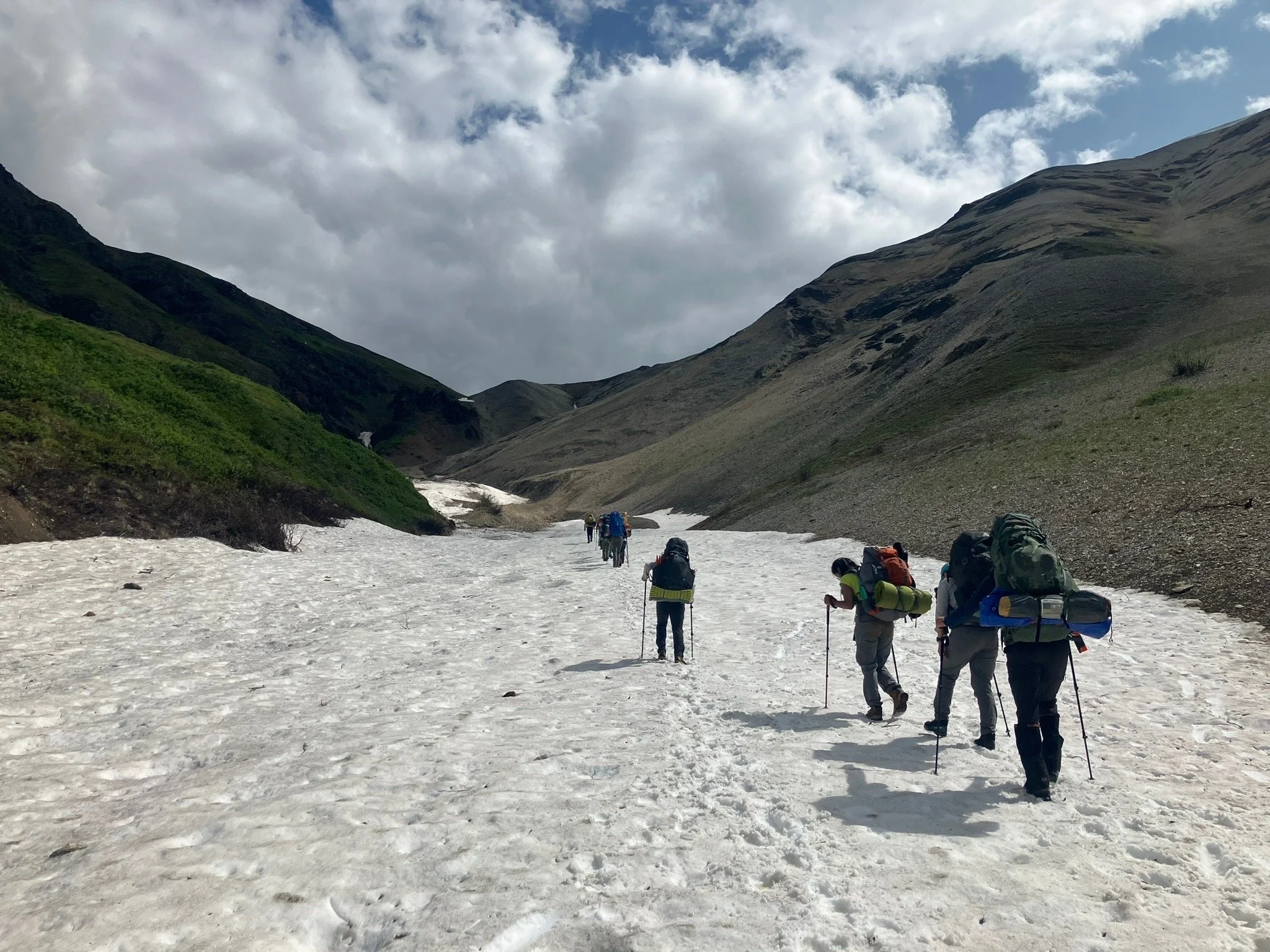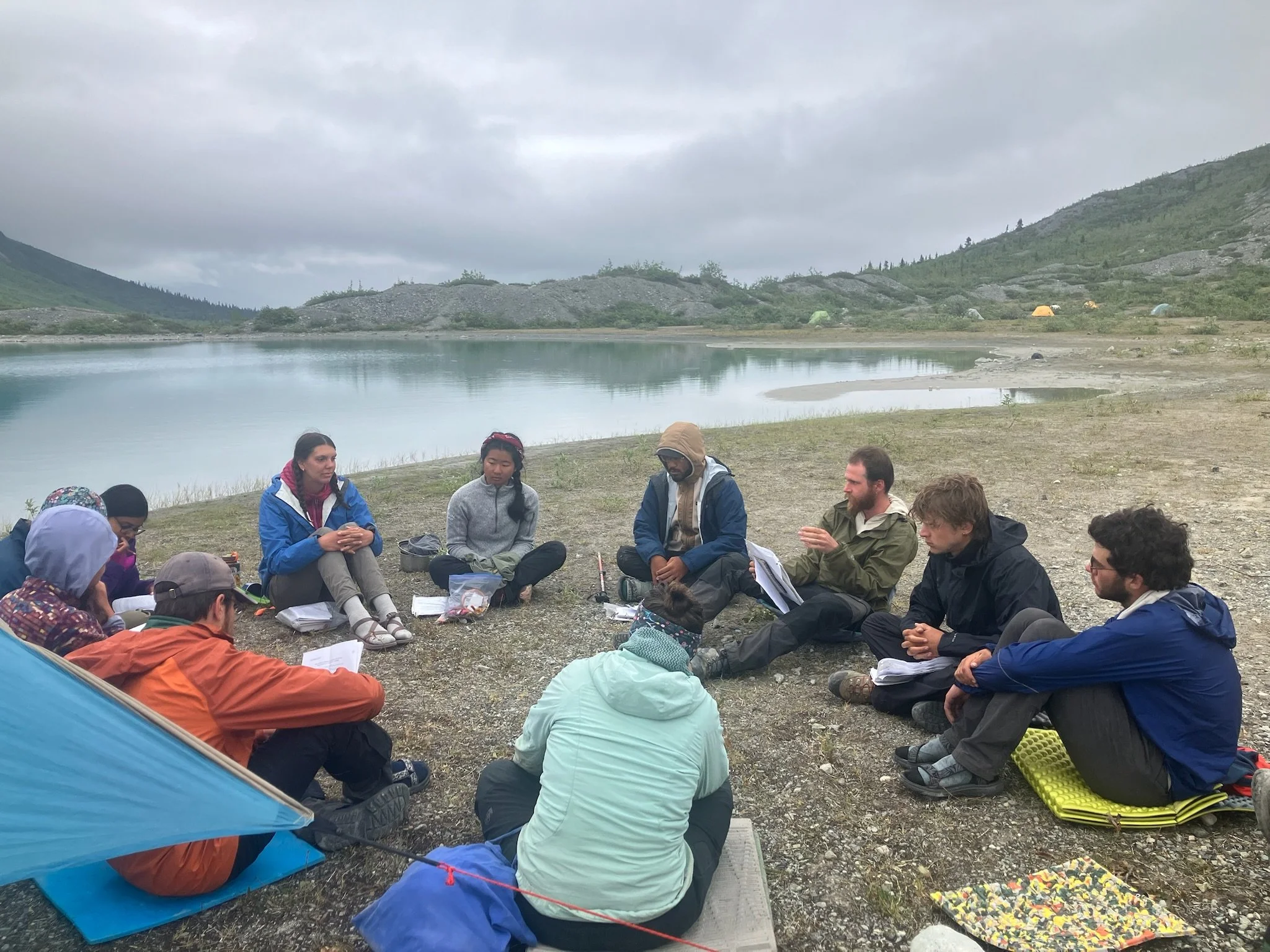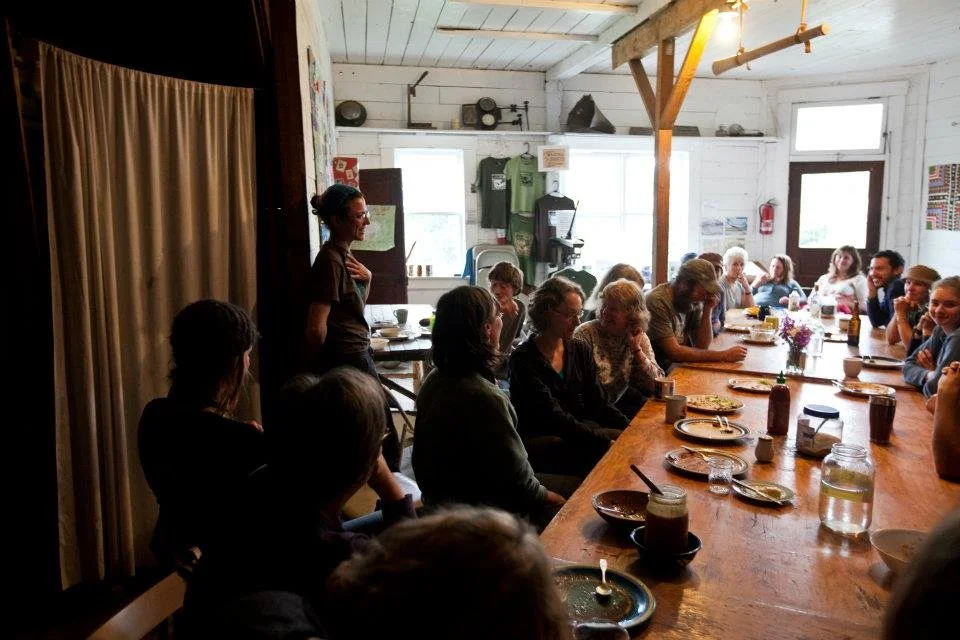
Learning from the dynamic landscapes of the Wrangell Mountains
Wrangell Mountains Field Studies is a collaboration between the Wrangell Mountains Center and University of Maine School of Earth and Climate Sciences and Climate Change Institute.
We welcome students from around the world to participate in our summer field research program and collaborative learning community, preparing for careers in the sciences, humanities, and public policy.
The Wrangell Mountains of Alaska reveal Earth’s systems in motion: glaciers advancing and retreating, rivers carrying immense sediment loads, ecosystems adapting to instability, and human communities shaping and shaped by this terrain. Wrangell Mountains Field Studies brings undergraduates into this living landscape for seven weeks each summer. Students earn 6 upper-division credits from the University of Maine School of Earth and Climate Sciences, while learning to observe and study processes across scales—from tectonic uplift and glacial melt to ecological change and human land use practices. Based in McCarthy and the surrounding Wrangell-St. Elias National Park & Preserve, the program blends structured classes, backcountry expeditions, and original research projects, building both scientific skills and the collaborative practices needed for remote fieldwork.
Field Studies | We are an interdisciplinary field program taking place among the glaciated subarctic mountains, valleys, alpine tundra, and boreal forest of the Wrangell Mountains.
McCarthy, Alaska | We are based in McCarthy, a community within Wrangell-St. Elias National Park & Preserve
6 semester credits | Awarded to students by the University of Maine School of Earth & Climate Sciences
7 weeks | June 22 – August 10, 2026

Field Studies | We are an interdisciplinary field program taking place among the glaciated subarctic mountains, valleys, alpine tundra, and boreal forest of the Wrangell Mountains.

McCarthy, Alaska | We are based in McCarthy, a community within Wrangell-St. Elias National Park & Preserve

7 weeks | June 22 – August 10, 2026

6 semester credits | Awarded to students by the University of Maine School of Earth & Climate Sciences
Curriculum (text not final)
The Field Studies Curriculum explores subarctic ecological and geophysical processes, glaciology, land use practices, and system modeling. Local narratives and stories are an important part of the course, along with adding to our annual compilation of selected academic readings. Climate change impacts to local landscapes and social-ecological systems, \as well as regional climate adaptation and land stewardship planning, are unifying themes.
Students plan and execute original small-group field research projects of their own design, in consultation with faculty -- many of whom have ongoing research projects of their own. These projects include fieldwork and data collection, writing, and making figures/illustrations. Final projects are compiled for public presentation at the Field Studies Symposium.
McCarthy (Tnf)
In the remote town of McCarthy, students learn alongside core and guest instructors from across the region, and take part in community events and workshops. Daily life in town revolves around the Wrangell Mountains Center (WMC) campus headquartered at the historic “Old Hardware Store.” Students and instructors work alongside local residents and experience off-grid life in a rural Alaskan community. Classes and discussions are take place on the WMC campus, or atwithin the nearby boreal forests, glacial moraines, and riverbeds, and creeks. Workshops, lectures, and artist residencies hosted by the Wrangell Mountains Center create diverse learning opportunities foropen to students and community members.
Learn more about life in McCarthy here. (hyperlinked)
The Backcountry (Tnf)
From McCarthy, we trek up the Kennicott Glacier and into the surrounding mountainsous terrain of Wrangell-St. Elias National Park & Preserve. Four of the program’s seven weeks are take place here. In the backcountry. Wwe use natural history field journaling and sketching techniques to notice landscape processes from momentary to geologic timescales. Field research techniques in geosciences and environmental sciences are taught in situ, at sites selected for student projects. The glacial valleys here reveal 230 million years of transformation, from volcanic island arcs and migrating plates to Pleistocene glaciations and Little Ice Age moraines. Along glacier margins we witness deglaciation, ecological succession, and unstable slopes reshaped by uplift and erosion. Rock glaciers, tundra, permafrost, boreal forest, and human communities all form part of an interwoven system. Articulating the links between these systems across temporal and spatial scales is the guiding framework of the course.
Learn more about life in the backcountry here. (hyperlinked)
Wrangell Mountains Field Studies is an interdisciplinary field research program in subarctic landscapes, featuring high mountains, alpine tundra, boreal forest, and extensive glaciation
Based in McCarthy, Alaska, a remote community in the middle of Wrangell-St. Elias National Park & Preserve
Course dates: June 22 - August 10, 2025 (7 weeks long)
Awards 6 semester units of upper-division Earth/Climate Sciences field research credit from the University of Maine
Wrangell Mountains Field Studies
The Field Studies Curriculum explores subarctic ecological and geophysical processes, glaciology, system modeling, and land use/natural resource management. Local narratives and stories are an important part of the course, adding to our annual compilation of selected academic readings. Climate change impacts to local landscapes and social-ecological systems, as well as regional climate adaptation, are unifying themes.
In McCarthy, students learn alongside core and visiting instructors from across the region, and take part in community events and workshops. In the backcountry we use natural history field journaling and sketching techniques to notice landscape processes from momentary to geologic timescales. We travel across glaciers and through boreal forest into high mountain tundra, taking routes through remote terrain to reach sites selected for student projects. Academic readings and seminars provide context for fieldwork.
The location is well-suited for learning about dynamic changes and far-from-equilibrium conditions. The lands within Wrangell-St. Elias National Park and Preserve are heavily glaciated; glaciers connect the high mountains and their eroded material to the Copper River watershed and North Pacific, forming landscapes in constant states of change following glacial advance or retreat.
WMFS is hosted by the Wrangell Mountains Center in the tiny town of McCarthy, Alaska, as a collaborative learning community and field research program comprised of our students, Faculty, staff, and community partners in the Copper River Basin.
Students learn backcountry skills necessary for local terrain and conditions. Previous experience is helpful but not required. Most joining WMFS are upper-division undergraduates and the course is structured accordingly, but graduate students and students unaffiliated with a university are also welcome. We work with graduate students and researchers to accommodate their research goals in the program. WMFS is generally rigorous enough to meet departmental field research and/or capstone project requirements in addition to general credit requirements – we can provide supplemental credit transfer information to students and/or their home institutions if needed.
Students interested in climate-related field research will be interested in both Wrangell Mountains Field Studies and the Juneau Icefield Research Program (JIRP). We encourage students interested in high-latitude systems and climate science to consider participation in both programs over two summer seasons, as the experiences are complementary. The WMFS field season focuses on links between alpine tundra, boreal forest, and glacier systems of the Wrangell Mountains; the JIRP field season focuses closely on the ice, climate, and geomorphology processes of the Juneau Icefield. For the motivated student, these two curricula could fit together to present a comprehensive study of varying glacial systems, and the climatic, ecological, geological, and social processes that comprise them. Staff at WMFS and JIRP are eager to discuss options with students weighing participation in either or both programs.









